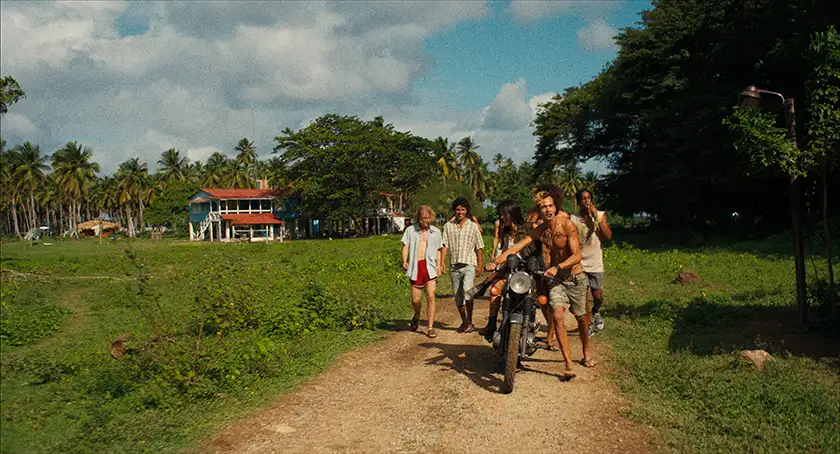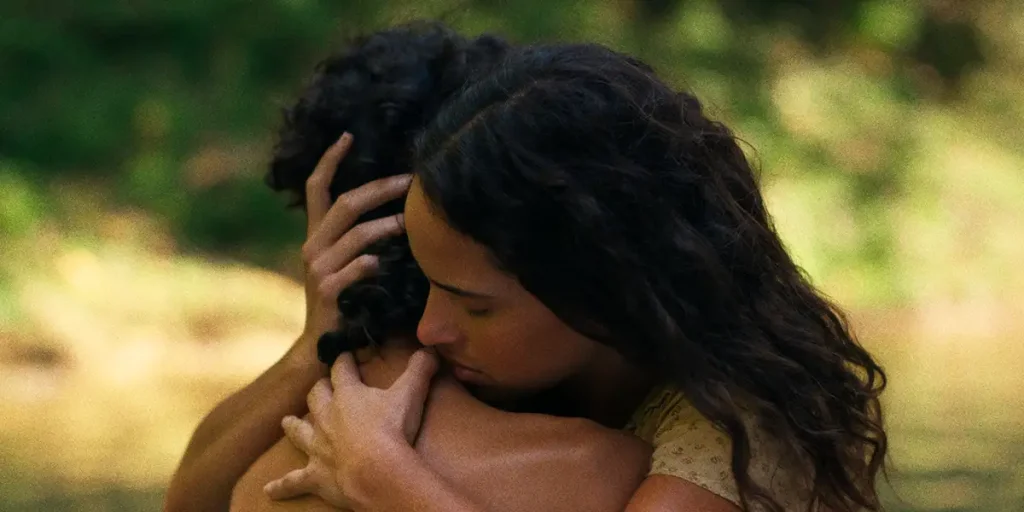Tyler Nilson and Michael Schwartz’s Los Frikis is an affecting and beautifully acted coming-of-age story set in early 90s Cuba.
Writers & Directors: Tyler Nilson & Michael Schwartz
Genre: Coming of Age, Drama
Run Time: 112′
U.S. Release: December 20, 2024 (limited); December 25, 2024 (wide)
U.K. Release: TBA
Where to Watch: In US theaters
Inspired by true events, Los Frikis is a film about resilience, friendship, love and hardships. Set in early 90s Cuba, the movie tells us the story of Gustavo (Eros de la Puente), a normal kid who idolises his big brother, punk rocker Paco (Héctor Medina), a rebel who plays American music alongside his band, despite that sort of cultural expression being banned throughout the country by Fidel Castro’s government. They don’t have much money and don’t seem to be getting any formal education, but through their rebellion and love for music, they seem to be happy enough.
That is, until Paco is given terrible news: his family is going to leave Cuba for the States, and because they consider him such a troublemaker, they are going to go without him. Initially, Gustavo leaves alongside his father and siblings, but when he realises, in the middle of the ocean, that their raft can’t hold all of them, he decides to jump and go back to Cuba, not only because he wants to save his family, but because he wants to be with his brother. However, it turns out that, when his family left, Paco intentionally injected himself with HIV so he could be sent to a sanatorium and have better living and feeding conditions than in his previous (and now empty) home.
When he finds out, Gustavo doesn’t inject himself with anything but does manage to fake his papers with a well-meaning doctor, so he can be sent to the same sanatorium and be with his brother. There, he makes many new friends and even falls in love with the place’s sole caretaker, a genuinely nice woman called Maria (Adria Arjona, of Hit Man and Andor). Initially, he keeps the fact that he doesn’t actually have HIV a secret, but when she finds out the truth, a love affair starts between the pair. After all, she hasn’t had sex with anyone in ages (for obvious reasons), and she takes this opportunity to be intimate with someone she actually cares about. But even though things seem to be going great, both the audience and Gustavo know that something as idyllic as this simply cannot last for long.
Los Frikis paints a realistic and emotionally devastating picture of the living conditions most people in Cuba had in the early 90s. The fact that HIV patients in a sanatorium had better access to food and water than regular citizens is surprising enough, but the movie also shows us the kind of discrimination these people had to go through. Homophobia was rampant, and although not all patients at the sanatorium are queer, whenever they leave the place they are considered pariahs; they are given awful, homophobic insults by regular people, authorities such as police officers, and even kids. Their existence at the sanatorium feels like a dream – a dream that is broken whenever they go to the city or have to interact with people from the outside world.
The fact that Gustavo, Paco and the rest of the patients manage to have such good lives in the sanatorium helps to give the film a sort of hopeful, optimistic tone. Paco continues to play his music, a couple of their friends (one of them having worse HIV symptoms than the others) get married, Maria treats them all really well, and they form a small but strong community, taking care of each other. They live in a liberal bubble in the middle of a conservative and oppressive country, knowing that they have to love one another in order to survive. It’s rather nice, and it allows Gustavo to mature as a person without having the same worries as the rest of the country’s population.
Which doesn’t mean, of course, that there is no conflict. For the most part, Los Frikis feels like a rather relaxed “hang-out” movie despite its dark subject matter, but from time to time, we are reminded of Gustavo’s little secret, as well as the other characters’ worsening conditions. Paco, in particular, starts as a headstrong rebel, but little by little, he starts getting weaker, being consumed by his disease, his friends also starting to be affected by the virus. Much like the characters, whenever the viewer begins to forget about the context in which the characters live, the movie does something to wake them up from the dream.
The performances are all great. Eros de la Puente is believable as Gustavo, a well-meaning kid who starts the movie as someone who cannot fend for himself but has to learn to take care of both his loved ones and his own life. Héctor Medina is, of course, a stand-out, turning Paco into a tragic figure. He has been a rebel all his life, but once he arrives at the sanatorium, has to realise he isn’t invincible. And predictably, Hollywood star Adria Arjona is great in her first Spanish-language role in a while. She portrays Maria as a kind person with a mysterious past, and as someone who appears to be trying to find some kind of redemption through her work at the sanatorium. She’s initially presented almost as a saint-like figure, mainly because we see her through the eyes of the male characters, but through her lusty affair with Gustavo, we see that she’s as human and vulnerable as the others.

Directors Tyler Nilson and Michael Schwartz (of The Peanut Butter Falcon fame) do a great job of immersing the viewer in this world. Using handheld camerawork and setting most of the action in real-life locations, they manage to make the story feel real and intimate. Cinematographer Santiago Gonzalez’s work is beautiful, favouring close-ups of the characters’ faces over traditional (and stiffer) master shots, having his camera continually follow Gustavo and the others. The audience is in the action alongside Los Frikis’ protagonists, which accentuates the emotions they are going through. Thus, it’s easy to empathise with these complicated, rebellious and very human characters.
I had heard very little about Los Frikis before seeing it, but now, it has easily turned into one of my favourite films of the year. Elegantly directed and photographed, and featuring very strong character work and even stronger performances, this is a well-thought-out and mature drama. Los Frikis is all about friendship and sex; it’s about family and sacrifice and rebelling against authority, even if that means doing damage to one’s body or soul. It’s emotional without feeling manipulative and should resonate with pretty much any viewer, whether they know about the history of Cuba or not. I was pleasantly surprised by Los Frikis, one of 2024’s best hidden gems.
Los Frikis: Movie Plot & Recap
Synopsis:
Set in early 90s Cuba, Los Frikis follows an innocent boy who goes to a sanatorium with his punk rocker brother after the latter injects himself with HIV.
Pros:
- A thoughtful and affecting film.
- Performances are all great, Adria Arjona being the stand-out.
- Beautiful cinematography.
- It manages to be emotional without being manipulative.
Cons:
- A couple of predictable story beats.
Los Frikis will be released theatrically in LA and NY on December 20, 2024, followed by a national rollout from December 25.

